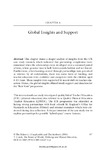Global Insights and Support
| dc.contributor.author | Lynch, TJ | en |
| dc.date.accessioned | 2016-10-09T14:56:04Z | |
| dc.date.accessioned | 2016-10-09T15:28:19Z | |
| dc.date.available | 2016-10-09T14:56:04Z | |
| dc.date.available | 2016-10-09T15:28:19Z | |
| dc.date.issued | 2016-07-30 | en |
| dc.identifier.isbn | 3319316664 | en |
| dc.identifier.isbn | 978-3-319-31667-3 | en |
| dc.identifier.other | 6 | en |
| dc.identifier.uri | http://hdl.handle.net/10026.1/6376 | |
| dc.description | This book uses the example of a partnership journey between universities, schools, the local health industry as well as a number of government organisations which worked to ensure the growth of physical education in primary education. The initiative employed the United Nations (UN) ideals as a model and contextualised them within local schools and communities. What began as a pathway seed quickly grew to involve multi-stakeholder partnerships and therefore explores how the UN Sustainable Development Goals (SDG) may be implemented at a grass roots level. | en |
| dc.description.abstract |
This chapter shares a deeper analysis of insights from the UK case study research, which indicated that partnership complexities were minimised when the relationships were developed over a sustained period of time, where genuine trust is built between stakeholders and not forced. Furthermore, when learning created through partnerships were perceived as relevant by all stakeholders, there was some form of funding, and teacher educators were confident and competent with the children aged 5–11 years. These insights were supported by recent shifts in teacher education. Hence, the global insights offered timely support and direction for the ‘Best Start’ programme. | en |
| dc.format.extent | 11 | en |
| dc.format.extent | 87 - 98 (12) | en |
| dc.format.medium | e-book & hard cover | en |
| dc.language.iso | en | en |
| dc.publisher | Springer International Publishing | en |
| dc.relation.ispartof | The Future of Health, Wellbeing and Physical Education Optimising Children's Health through Local and Global Community Partnerships | en |
| dc.relation.replaces | http://hdl.handle.net/10026.1/6355 | |
| dc.relation.replaces | 10026.1/6355 | |
| dc.subject | Physical Education | en |
| dc.subject | Health | en |
| dc.subject | Well-being | en |
| dc.subject | Partnerships | en |
| dc.subject | Community | en |
| dc.subject | Collaborations | en |
| dc.subject | Teacher Education | en |
| dc.subject | Social Justice | en |
| dc.subject | Leadership | en |
| dc.subject | Problem Solving | en |
| dc.subject | Sustainable Development Goals | en |
| dc.subject | United Nations | en |
| dc.title | Global Insights and Support | en |
| dc.type | Book Chapter | |
| plymouth.author-url | http://www.timothylyncheducation.com/ | en |
| plymouth.edition | 1 | en |
| plymouth.volume | 1 | en |
| plymouth.publisher-url | http://link.springer.com/chapter/10.1007/978-3-319-31667-3_6 | en |
| plymouth.publication-status | Published | en |
| plymouth.series | 2016 | en |
| dc.identifier.doi | 10.1007/978-3-319-31667-3_6 | en |
| plymouth.organisational-group | /Plymouth | |
| plymouth.organisational-group | /Plymouth/Faculty of Arts, Humanities and Business | |
| plymouth.organisational-group | /Plymouth/Faculty of Arts, Humanities and Business/Plymouth Institute of Education | |
| dc.publisher.place | Switzerland | en |
| dc.rights.embargoperiod | No embargo | en |
| rioxxterms.versionofrecord | 10.1007/978-3-319-31667-3_6 | en |
| rioxxterms.licenseref.uri | http://www.rioxx.net/licenses/all-rights-reserved | en |
| rioxxterms.type | Book chapter | en |
| plymouth.oa-location | http://www.palgrave.com/de/book/9783319316666 | en |


